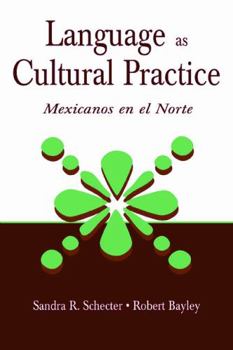Language as Cultural Practice: Mexicanos En El Norte
Select Format
Select Condition 
Book Overview
Language as Cultural Practice: Mexicanos en el Norte offers a vivid ethnographic account of language socialization practices within Mexican-background families residing in California and Texas. This account illustrates a variety of cases where language is used by speakers to choose between alternative self-definitions and where language interacts differentially with other defining categories, such as ethnicity, gender, and class. It shows that language socialization--instantiated in language choices and patterns of use in sociocultural and sociohistorical contexts characterized by ambiguity and flux--is both a dynamic and a fluid process.
The study emphasizes the links between familial patterns of language use and language socialization practices on the one hand, and children's development of bilingual and biliterate identities on the other. Using a framework emerging from their selection of two geographically distinct localities with differing demographic features, Schecter and Bayley compare patterns of meaning suggested by the use of Spanish and English in speech and literacy activities, as well as by the symbolic importance ascribed by families and societal institutions (such as schools) to the maintenance and use of the two languages. Language as Cultural Practice:*provides a detailed account of the diversity of language practices and patterns of use in language minority homes;
*offers educators detailed information on the language ecology of Latino homes in two geographically diverse communities--San Antonio, Texas, and the San Francisco Bay Area, California;
*shows the diversity within Mexican-American communities in the United States--families profiled range from rural families in south Texas to upper middle class professional families in northern California;
*provides data to correct the prevalent misconception that maintenance of Spanish interferes with the acquisition of English; and
*contributes to the study of language socialization by showing that the process extends throughout the lifetime and that it is an interactive rather than a one-way process. This book will particularly interest researchers and professionals in linguistics, anthropology, applied linguistics, and education, and will be useful as a text in graduate courses in these areas that address language socialization and learning.
Format:Paperback
Language:English
ISBN:0805835342
ISBN13:9780805835342
Release Date:May 2002
Publisher:Routledge
Length:248 Pages
Weight:0.75 lbs.
Dimensions:0.5" x 6.3" x 9.0"
Customer Reviews
0 rating





